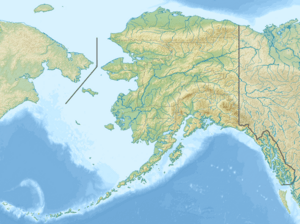Whiting River facts for kids
Quick facts for kids Whiting River |
|
|---|---|
|
Location of the mouth of the Whiting River in Alaska
|
|
| Country | Canada, United States |
| Province or state | British Columbia, Alaska |
| Physical characteristics | |
| Main source | Coast Mountains British Columbia |
| River mouth | Gilbert Bay, Port Snettisham 33 miles (53 km) southeast of Juneau, Juneau Borough, Tongass National Forest, Alaska 0 ft (0 m) 57°57′26″N 133°52′54″W / 57.95722°N 133.88167°W |
| Length | 50 mi (80 km) |
The Whiting River is a river that flows for about 80 kilometers (50 miles). It runs through both the United States (in Alaska) and Canada (in British Columbia). This river flows into Stephens Passage near Juneau, Alaska. It is located between the mouths of two other rivers, the Taku and Stikine Rivers.
The biggest branch of the Whiting River is called the South Whiting. The river's starting point is near the northern part of the Stikine Icecap. The Whiting River flows across the international border between Canada and the United States. It begins in the Chechidla Range mountains and ends in Gilbert Bay, which then flows into Stephens Passage.
Naming the Whiting River
How the River Got Its Name
In 1888, a U.S. Navy officer named Lieutenant Commander C. M. Thomas explored this area. He decided to name the river after one of his team members. The river was named in honor of assistant surgeon Robert Whiting, who was part of his surveying group.
 | Anna J. Cooper |
 | Mary McLeod Bethune |
 | Lillie Mae Bradford |


